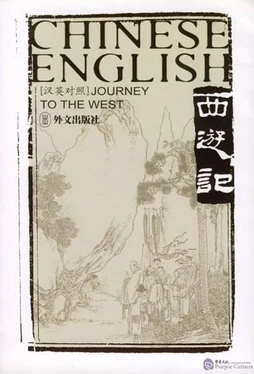“What a thing to say, Master,” said Monkey, “As the saying goes, 'A teacher for a day is one's father for life.' As your disciples we are like your sons. There's another saying that
A son does not have to shit silver or gold;
As long as be can do what's needed he'll be fine.
If you're not feeling well you shouldn't be worrying about the journey being delayed. There'll be no problem about waiting for a few days.” The three brother-disciples all looked after their master. The morning was followed by midday and dusk, and after a good night dawn returned. Time fled, and three days had soon passed.
The morning after that Sanzang tried to sit up, calling, “Wukong, as I have been very ill these last couple of days I have not asked you before: have people been giving food to the lady Bodhisattva we rescued?”
“What are you bothering about her for?” laughed Monkey, “What you should be concerned with is your own illness.”
“Yes, yes,” said Sanzang. “Help me up and fetch me paper, brush and ink. Borrow an inkstone here in the monastery.”
“What do you want them for?” Monkey asked.
“I want to write a letter,” Sanzang replied. “I shall seal it up with our passport and ask you to deliver it for me to His Majesty Emperor Taizong in Chang'an.”
“Easy,” said Monkey, “I may not be much good at anything else, but when it comes to delivering letters I'm the champion of the whole world. So wrap the letter up and give it to me. I'll take it to Chang'an in a single somersault, give it to the Tang Emperor, and come back with another somersault before your brush and inkstone have dried up. But why do you want to write a letter? Tell me what you want to say in the letter-you can write it down later.”
“This is what I will write,” said Sanzang, weeping:
“Your subject beats his head three times upon the ground,
With a triple shout of 'Long live Your Majesty' as I bow to my lord.
The civil and military officials ate all present,
And four hundred courtiers all listen to what is said.
Years ago I left the East on your command,
Hoping to see the Buddha on the Vulture Peak.
But on my journey I have met with obstructions;
And been delayed by unexpected disaster along the way.
My illness is grave; I cannot move one step;
The gate to Buddha is as distant as the gate to heaven.
I will not live to bring back the scriptures;
I submit with respect that a new envoy should be sent.”
When Monkey heard this he could not help bursting out into uproarious laughter. “You're hopeless, Master,” he said, “thinking that sort of thing after just a touch of illness. If you were seriously ill you'd only have to ask me to find out whether you were going to live or die. I have my own special way of dealing with it. I'd ask, 'Which king of the Underworld dared think of this? Which of the judges issued the warrant? Which demon messenger is coming to fetch him?' If they make me angry I'll lose my temper the way I did when I made havoc in Heaven, smash my way into the Underworld with my cudgel, capture the ten kings and rip the sinews out of every one of them. I'll show them no mercy.”
“Stop that boasting, disciple,” Sanzang replied. “I am very ill.”
“Brother,” said Pig, going up to him, “it's very awkward to have the master saying he's in a bad way and you insisting he isn't. Let's settle things as quickly as we can, sell the horse, pawn the luggage, buy a coffin to bury the master in and split up.”
“You're talking out of turn again, you idiot,” Monkey replied. “What you don't realize is that the master used to be our Tathagata Buddha's second disciple. His original name was the Venerable Golden Cicada. This is great hardship he has to endure because he once slighted the Buddha's Dharma.”
“But, brother,” Pig replied, “even if the master did slight the Buddha's Dharma he was exiled to the East and born into another body amid the sea of right and wrong and the battlefield of tongues. He swore an oath to go to the Western Heaven, worship the Buddha and fetch the scriptures. Every time he's met an evil spirit he's been tied up; and every time he's come across a monster he's been hung up. He's had to put up with every kind of agony. That should be enough. Why has he had to be ill as well?”
“This is something you wouldn't know about,” Monkey replied. “The master once dropped off to sleep instead of listening to the Buddha teaching the Dharma, and as he drowsed he trod on a grain of rice with his left foot. That is why he has to be ill for three days in the lower world.”
“So goodness only knows how many years someone who eats as messily as I do will have to be ill,” replied a shocked Pig.
“Brother,” Monkey replied, “the Buddha will spare ordinary creatures such as you. There's something else you don't know. As the poet said,
Hoeing millet in the noonday sun;
Sweat drops on the ground beneath the millet.
Who understands that of the food that's in the bowl,
Every single grain was won through bitter toil?
The master will only be ill today. Tomorrow he'll be better.”
“I am feeling different today from how I did yesterday,” said Sanzang. “My throat is absolutely parched. Go and find some cold water somewhere for me to drink.”
“Fine,” Monkey replied. “If water's what you want, Master, that means you're better. I'll go and fetch some.”
Monkey at once took the begging bowl and went to the kitchen at the back of the monastery, where he came across all the monks red-eyed and sobbing with grief. The only thing was that they dared not cry aloud.
“Don't be so petty, little monks,” said Brother Monkey. “Before we leave we'll thank you for the days we've spent here, and we'll pay for our cooking fuel and lighting by the day. You really shouldn't be such pustules.”
“We wouldn't dare accept it,” the lamas said at once, falling to their knees, “we wouldn't dare.”
“What do you mean, you wouldn't dare?” said Monkey. “It must be that long-snouted monk of ours who has an enormous appetite. He'd eat you out of house and home.”
“My lord,” the lamas replied, “there are over a hundred senior and junior lamas in this monastery. If each of us kept you for a single day we could afford to support you for over a hundred days. We're not the sort of skinflints who'd calculate what you will cost us in food.”
“If you're not working out the cost then why are you sobbing?” Monkey asked.
“Lord,” the lamas replied, “there's an evil monster in the monastery. We don't know which mountain it's from. Last night we sent two junior lamas to strike the bell and beat the drum. We heard the sound of the bell and the drum but the lamas never came back. When we looked for them the next day all we found were their monk's hats and shoes lying in the courtyard at the back and their skeletons. They had been eaten. In the three days you have been here six lamas have disappeared from the monastery. That's why we can't help being frightened and grieved. When we realized that your venerable master was ill we couldn't stop these tears stealing out even though we kept the news to ourselves.”
“Say no more,” said Brother Monkey, who was both shocked and delighted by what he heard. “It must be an evil monster who's killing people here. I'll wipe it out for you.”
“My lord,” the lamas replied, “any evil spirit worthy of the name has magical powers. It's bound to be able to ride clouds, come out of the underworld and disappear again. As the ancients put it so well, 'Trust not the straightest of the straight; beware of the inhuman human.' Please don't take offence, my lord, when we say that if you can rid our monastery of this scourge that would be a great happiness for us. But if you can't catch it things will be pretty difficult.”
Читать дальше









